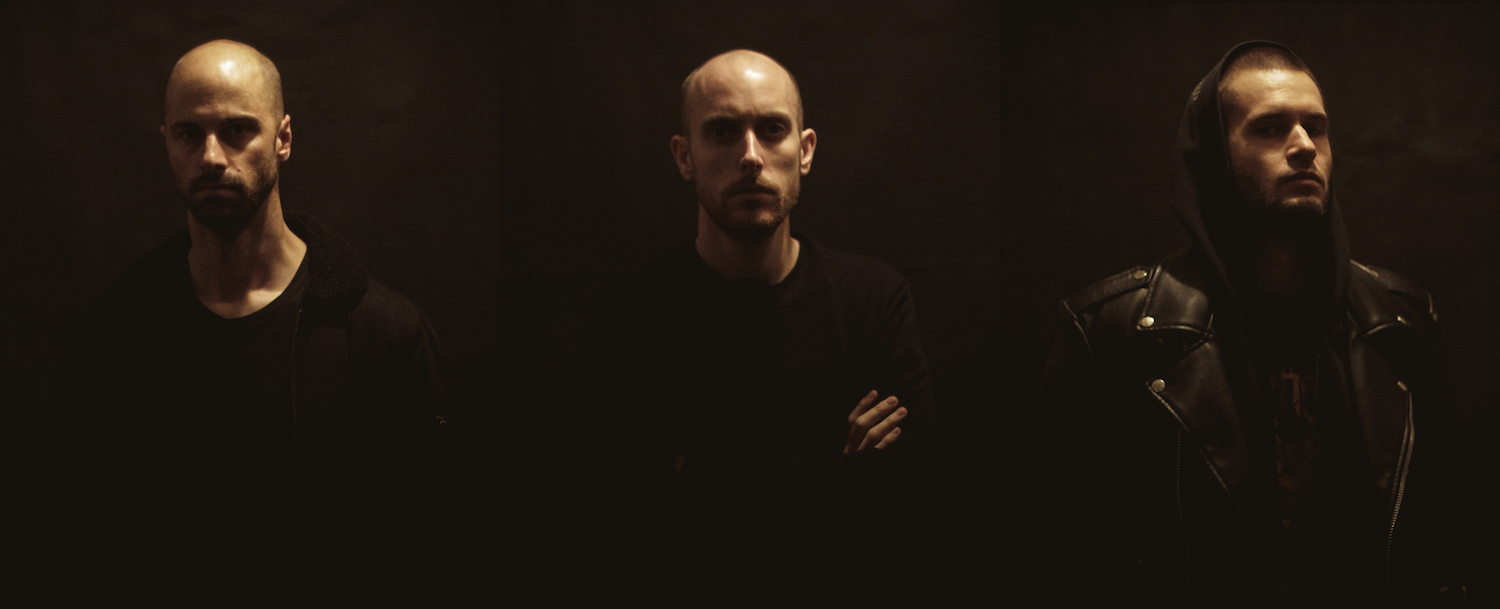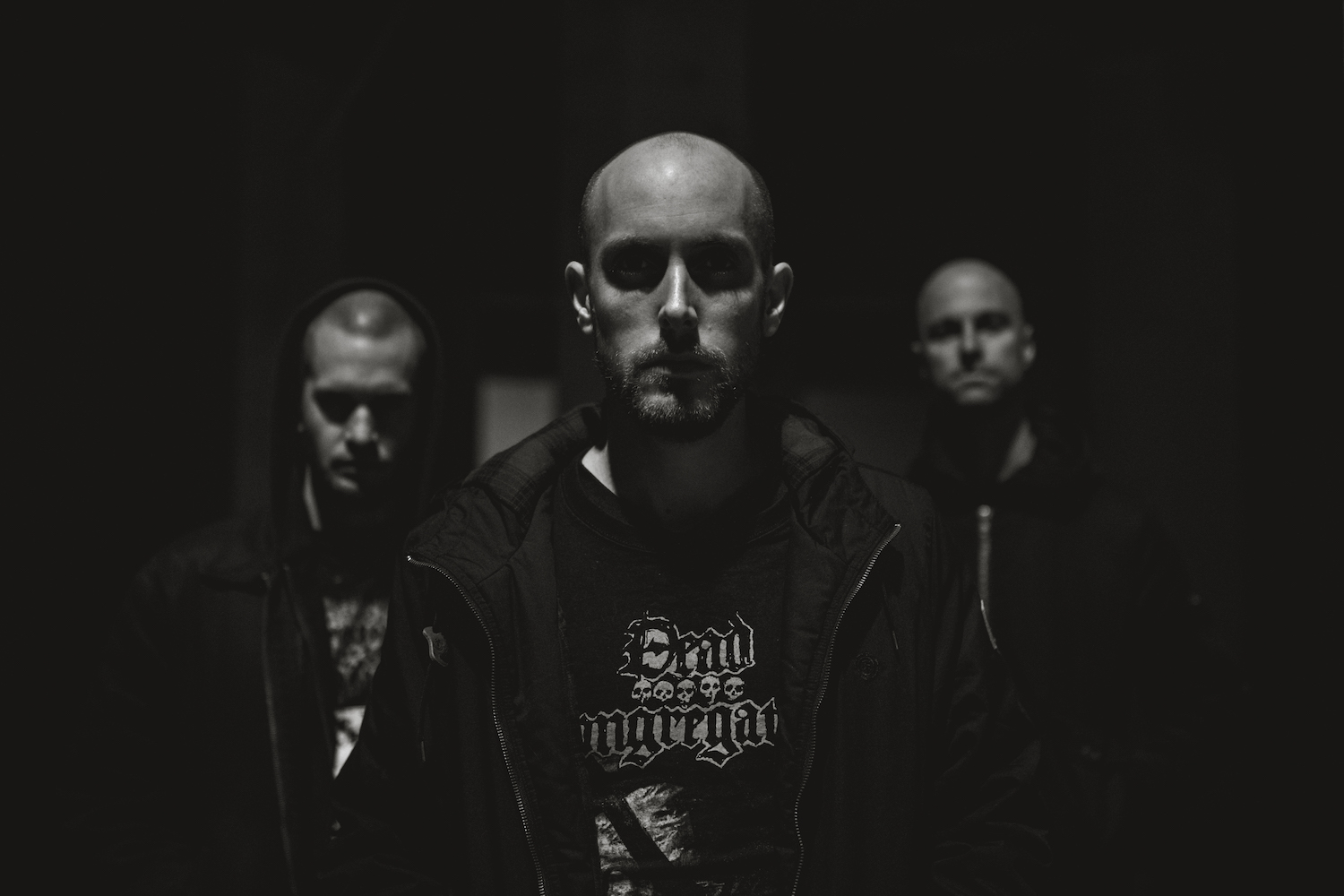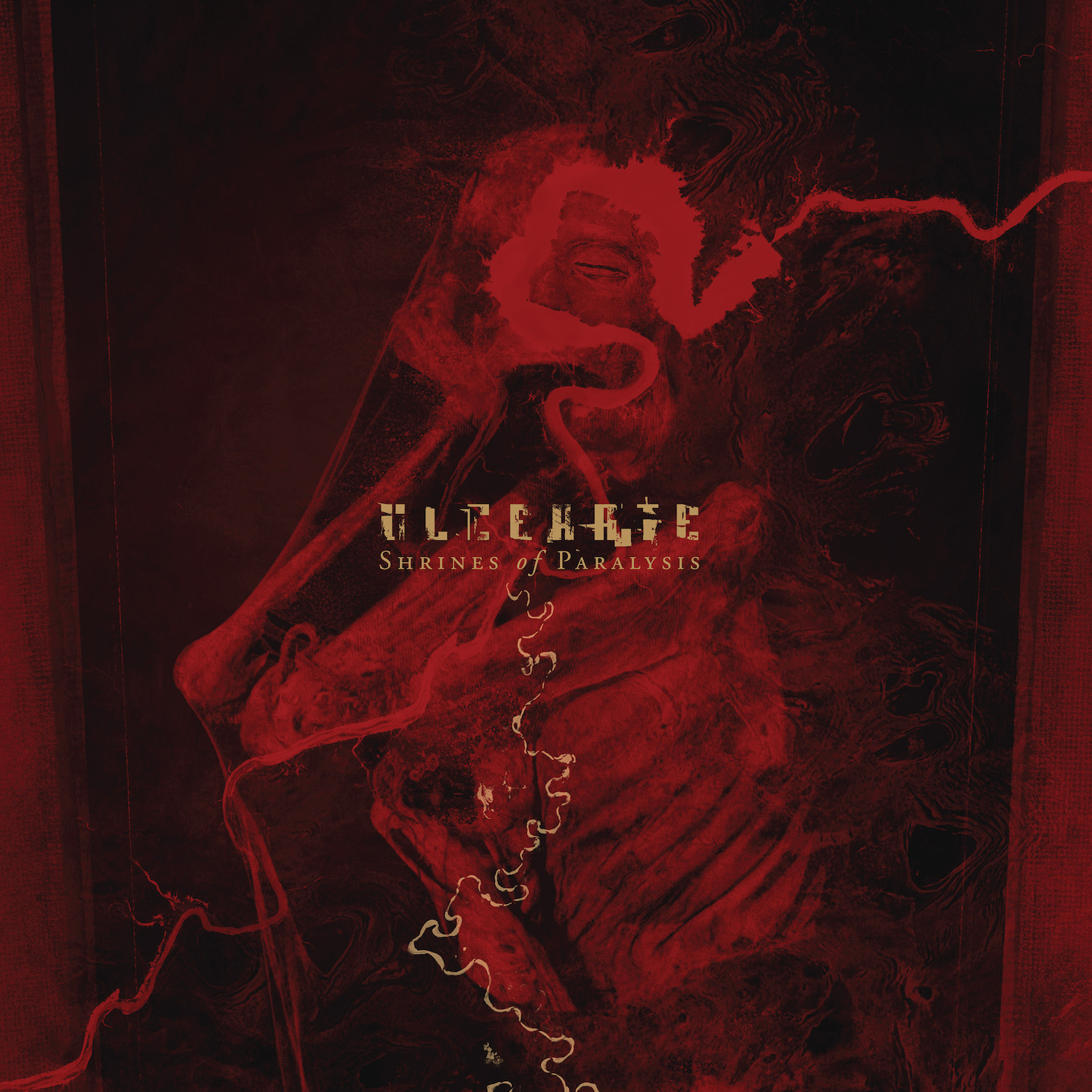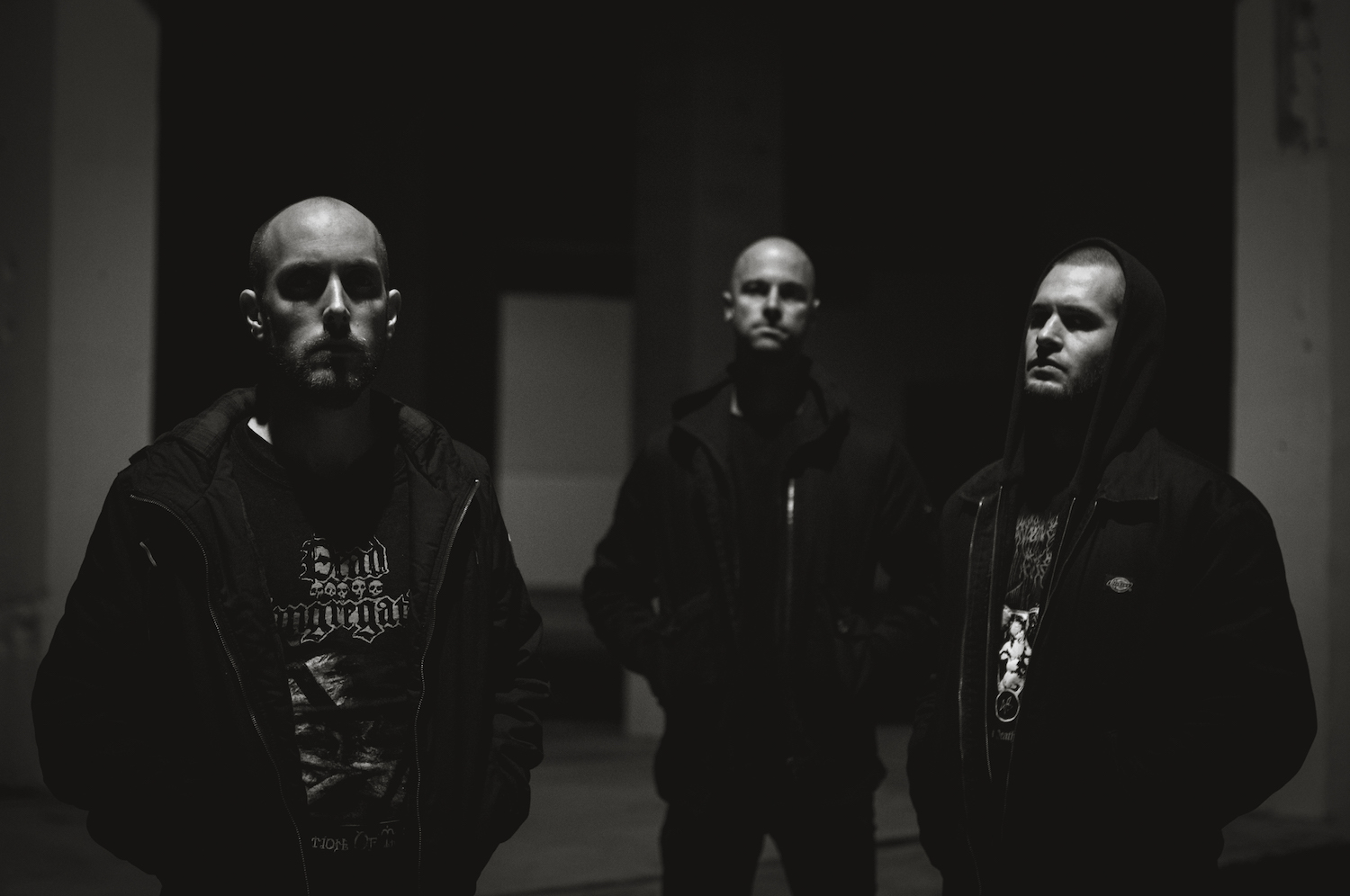Interview by Jason Williams
New Zealand-based technical death metal trio Ulcerate released their fifth full-length studio album ‘Shrines Of Paralysis’ via Relapse Records on October 28th 2016 and embarked upon a North American headline tour with support acts Zhrine and Phobocosm, starting with an LA area show at Complex in Glendale on November 2nd. This stage-shattering, skull-crushing band of three delighted extreme metal fans with their set, but before the show, drummer Jamie Saint Merat spoke to Metal Assault about the new LP, touring in the States, the state of metal in their home country, songwriting adventures, future plans and his thoughts on Patreon pledge campaigns. Enjoy the conversation below.
It’s been two-and-a-half years since the band has returned to the states. Tell me about how it was your first time around touring here, and what was it like for Ulcerate to have their eyes open to North America fans all across?
First time we were here actually was 2012. We did just a short East Coast run that was based around MDF (Maryland Death Fest). And that was the very first time, and it was only around 10 or so shows. It was great! A really great experience. We really had no idea of what to expect, to play in a new region you’ve never been to before. But the feedback we got was amazing. So skip forward a couple of years to 2014, we came back to tour for ‘Vermis’, and we did a much more extensive string of dates. The feedback was just a little bit better than the last time, and so we’re kind of hoping it’ll be the same thing this time. But it’s gone from having no idea what it’s like to play over here to now being one of our favorite regions to play. We’re very happy to be back.
A lot of times extreme metal bands who are maybe more well-known in other countries outside of North America, will take direct support or just supporting slots for a bigger band, same genre or more outside the extreme category. Was there a discussion initially before your first full tour here in 2014 to have the band in front of more eyes? Since it is difficult for said type of bands to generally get a good start touring in the states, was Ulcerate comfortable headlining right away?
(Laughs) I don’t know if it’s ‘comfortable.’ We decided to just make the jump and do it in Europe, and it just really worked. Prior to that, we always had been doing supports. It was really then after that we had felt the capacity to headline. But we just took the dive, you know? The same with how the events turned about, when we had MDF lined up, and then just before that we done like 4 weeks with Svart Crown in Europe, and it seemed to go really well. So we said, “Why don’t we just take that configuration, and do these US and Canadian shows, and see how it goes?” And it just worked out really well. So, we haven’t done the “package” thing, where it’s like five or six bands or whatever. We’ve just gone straight into doing our own thing, and it works for us.
Your latest album ‘Shrines of Paralysis’ was just released last week. It’s been three years since the album previously ‘Vermis’. I’ve noticed in the two songs that were released before street date, as dynamic as Ulcerate have always been, that this album is very well balanced in terms of the production, and a little difficult to describe, but some of the start/stop/interval moments on the previous records would hit the listener very abruptly, almost like a constant blunt force trauma to one spot over and over. There seems to be more layers and melody, if you will, present here. Talk about the progression music wise from ‘Vermin’ to this new record.
It was an organic growth, I guess. With ‘Vermis’, it was very intentional to get away from what we thought was quite a very clean and polished sort of sound on ‘The Destroyers of All’. So, ‘Vermis’ was like, “Let’s just make it a really fucking ruthless, filthy kind of sounding record” (laughs). It’s not like it’s lo-fi, but it’s not polished. And we can kind of lift all the blemishes and what not, in the sound. But the music that we’ve written for this album, ultimately we wanted to pull back on the dissonance that we’ve been pretty much using for all existence of the band (laughs). And yes, we’re just injecting a lot more kind of straightforward melody, really. So the production needed to kind of capture that. We’ve cleaned up the overall kind of sound and picture of the band, things like bass is super distorted, brought right into the fore in the mix. That kind of mirrors our live sound. We treat the bass as almost like a third guitar in some sections. So it’s just kind of finding that balance between the strings basically, with them all just as prominent as everything else. The bass for us just doesn’t play a background role, you know? I don’t know, it just feels to us it’s the most “hooky” material that we’ve done. And hopefully, going forward, we want to push that even further. I feel there’s a lot more bands doing the dissonant kind of thing now, and maybe it’s just that we feel like we kind of said all we can say with it. So who knows? The stuff in the future, the dissonance may not play a big part whatsoever.
You talk about the melodies and dissonance, and I’ve noticed that Michael (Hoggard) uses various guitar effects, in which he’ll play a guitar riff and then use the effect to play the counterpart for the left pan guitar side, and then back into his own. On your first two albums, you had a second guitar player. I feel sometimes that the music itself has so much going on, in terms of complexities, musical expression and the small moments hidden in each song, can be lost potentially with just one guitar playing the material live. Why does the three-piece setup work best for you?
You have to realize that a band is not just a mindset of going out and just picking up a second guitarist. The chemistry between the players, absolutely everybody has to be on the same page. We’ve been through three second guitarists now. For whatever reason, they just haven’t worked out. We’re not seeing quite eye to eye on things. I think basically for a live member, it’s not that much of a fulfilling role. And everything is written by myself and Michael. This just works, basically. The three of us are super dedicated, and super motivated for this band. We give it 110 per cent at all times. It’s just been super hard to find someone else that’s on the same wave length.
Last week I interviewed Luc Lemay of Gorguts and we were talking about the impact of ‘Obscura’ and how it completely changed the landscape of extreme metal music. And I feel that your music can be heard within that style. I asked Luc, how was the music for ‘Obscura’ made in the first place and he explained about getting out of their comfort zone by not using traditional metal practices like tremolo picking and fast picking riffs. I’m sure Gorguts is a huge influence in your lives and style of music. Where do you go inside of yourself to get that kind of sound, regardless of how happy, sad, or whatever mood you are currently in your life?
This far into it, it just feels very natural. When you’re a teenager and you’re first getting into it, it’s just the sheer excitement of this music, you know? Metal fans are very passionate and we latch onto stuff very very quickly, especially in our earlier years. And that’s what drives you to be like, “Fuck, I want to play like that guy! I want to play like that band!” And I guess early on, bands like Gorguts and Immolation were a huge influence on us, when we were in high school and stuff. But these days, it’s kind of like an extension of our personality. It’s the music we make. Wwhen we sit down to write, when we write death metal, this is what comes out of us. None of what we’re doing sounds experimental or avant-garde to our eyes. I sit down on drums and this is what I play. We’ve been doing this for 16 years now. If Luc is creating these bounds for his creativity… well, we do a little bit of that too, you know? Like, we’ll make sure every song is in a new guitar tuning, so it kind of forces your hand, that you can’t play the same chord shapes. Your fingers have to go to different spots on the fretboard, and all of a sudden, you’re coming up with stuff that you might not have, had you just been in your standard motion. But, in terms of what our influences are these days, I don’t know. It’s just a will to create the music, really.
Speaking about New Zealand earlier… as Australia is certainly long and far away, on its own as a continent, and an island. They have with them a very passionate and exciting metal fan base, with numerous bands comparing it to Japan in how much fun they have performing there, with the festivals and support. Does New Zealand share the same passion for metal as Australia?
New Zealand is really, really small, population wise. So our shows are very small there. I think mainstream music does well, as does most in the world. But when it comes to more niche genres, it’s tough. Even well known bands have a tough time playing in New Zealand, it’s just trying to draw people to shows, you know? But it goes either way. Some bands like Behemoth who come over and they sell out. But then, smaller bands, even bigger bands in the middle, but not nearing anywhere of Behemoth or Watain, they have a tough time. And so do we. We’ve been playing there since we’ve started, and turnouts to shows haven’t grown at all. It’s still around 150. There’s not a lot of activity, so it can be difficult.
And how do you compare that to your tours here in the US?
We find it pretty consistent here, to be honest. We get really really great, strong shows here. Much stronger than what we get at home. And in terms of the response, and just everything. There’s more enthusiasm for us coming over here. Whereas in New Zealand, it’s more, “Oh, just a hometown band.” It is what it is. We’re super happy with all of the shows that we’ve ever done over here.
I’ve felt that your label Relapse has done a responsible job with extreme bands, and still stayed true to themselves and the bands they sign. And it’s really difficult as well, with bands like Cryptopsy who now are independent, allowing everything to go through them over anything else. You can sell 10,000 records now and be in the Top 10 on the Billboard charts. Back in the day, if you were a major band and sold 500,000 albums, it might be a failure. Can you discuss how Relapse has treated you and have helped you reach new ground, and also the limits of what they may struggle with, as other record labels are?
Relapse has treated us great from the off set. The whole process is always super transparent and we’re all on the same page. Open discussion in terms of royalties and stuff like that. We get biannual reports and stuff, absolutely no problems in that regard. I think with this label versus bands thing that is currently going on, bands want to make a living out of what they’re doing. If you play extreme metal, it’s the worst financial choice you can make. If you want to support five people out of a band, even at like minimum wage, the sheer amount of income you have to make off the band is just astronomical. And I think where a lot of the tension lies between labels and bands is, bands feeling they they’re getting stiffed by a label because they can’t be these rock stars, you know? We all have careers, we always have gone into this band going knowing that we want to do this for passion. Any money that comes in is great. We’ll reinvest it into the band and that’s where it lies. We don’t pay ourselves from the band whatsoever. Any money we make goes into the funding this kind of stuff. So I think labels have a really good purpose because they’re like curators, I guess. I’m not really sure that answers your question, but in terms of Relapse, they treat us very well. Absolutely no complaints. The thing that they do best, for me personally, is the physical product is always outstanding. They put a lot of time and energy into making sure that the LP pressings, which are fucking great. The label has our back in that regard. You know that the product that people end up buying is higher quality, which means a lot to us.
With all that being said about touring and labels, Ne Obliviscaris, not too long ago, were one of the first extreme bands to use the Patreon pledge, doing what they can to stay on revenue and able to make touring life much easier, and there’s been a real mixed reaction from fans and even fellow metal bands. There’s great perspectives about it, and not so much from others. Do you personally believe that’s a good positive to help for extreme bands to make it?
I think the band is all in agreement that we’re not on board with it, personally. Fine if it works, it’s all good I guess, if your fans want to subscribe to your band, but that’s not where we’re coming from. And may be this is the kind of the line in the sand, with people like us falling into some kind of old school crowd (laughs). We feel alienated by it, honestly. I don’t feel that you should have to subscribe to it. And as I said before, we’ve got careers so we can support the band, but again, it’s not like they’re doing anything wrong by doing it, because their fans are more than happy to spend the cash, right? So who am I to say that what they’re doing is wrong. I’m not trying to say that, but it’s not for us.
I find it positive that they’re offering special perks, incentives and personal aspects, with music lessons, Q&A, merchandise only for their Patreons, etc.
And that’s cool, if that’s what you’re into. It’s just something that doesn’t interest us whatsoever. I’m not saying that we wouldn’t do lessons, but to do it as a package… no (laughs). Not our thing.
I appreciate your perspective, as I know it’s been a mixed and touchy subject, and wanted to get another band’s opinion about it.
It’s a hard question. It’s not hurting one, I guess. If everybody’s on board, and if there is transparency there, you know? But I don’t know… they want to make a living out of their band. And if you want to make a living out of your band in today’s age, this might be one of the few ways that you can do it, while still playing extreme-ish metal. I wouldn’t class them as that but they’re not the furthest thing in the extreme spectrum, and they’re not a pop band, or even a mainstream metal band, really. It’s a hard question. I don’t want to step on any toes and shit.
What’s next after this tour?
We are doing a fest in Australia, which is in March, I think. It’ll be a two-day fest, which is basically same set of four to five bands in two cities. It’s Marduk, Gorguts, MGLA, ourselves, and Departe from Australia. So that’s that, just a two-day thing. We may or may not hit New Zealand some point next year. And then we’re doing Brutal Assault in Czech Republic in August, and we’re also going to try to stage some shows around that area, and then I think the end of next year, November-ish, we’ll try and do central Europe. And beyond that, who knows. We’re not planning anything so far.
Will it be another two-and-a-half years until you come back to North America?
Possibly, man. It’s hard to say. We haven’t thought beyond this year really, and those festival events that we have lined up. If we can make it back, and it’s feasible and financially viable, we’ll be here in a heartbeat. But as I said, with our careers, it’s getting together with our schedules, and getting appropriate leave, all that sort of stuff.
Ulcerate links: website | facebook
Ulcerate + Zhrine + Phobocosm remaining North American tour dates:
11/08/2016 – Oakland, CA @ The Golden Bull
11/09/2016 – San Diego, CA @ Brick By Brick
11/10/2016 – Tempe, AZ @ Yucca Tap Room
11/11/2016 – El Paso, TX @ Mesa Music Hall
11/12/2016 – San Antonio, TX @ Limelight
11/13/2016 – Houston, TX @ Acadia Bar
11/15/2016 – New Orleans, LA @ Siberia
11/16/2016 – Gainesville, FL @ Atlantic
11/17/2016 – Tampa, FL @ The Brass Mug
11/18/2016 – Atlanta, GA @ The Earl
11/19/2016 – Richmond, VA @ Strange Matter
11/20/2016 – Baltimore, MD @ Metro Gallery
11/22/2016 – Philadelphia, PA @ Boot & Saddle
11/23/2016 – Boston, MA @ Great Scott
11/24/2016 – Montreal, QC @ Piranha Bar
11/25/2016 – Toronto, ON @ Coalition
11/26/2016 – Detroit, MI @ Corktown Tavern
11/27/2016 – Chicago, IL @ Reggies
11/28/2016 – Pittsburgh, PA @ The Smiling Moose
11/29/2016 – New York, NY @ Saint Vitus



